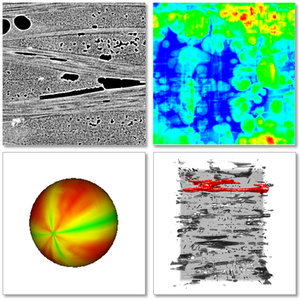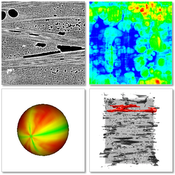Information
- Publication Type: Journal Paper with Conference Talk
- Workgroup(s)/Project(s):
- Date: June 2012
- Journal: Computer Graphics Forum,
- Volume: 31
- Number: 3
- Location: Vienna, Austria
- Lecturer: Andreas Reh
- Event: Euro Vis 2012
- Conference date: 5. June 2012 – 8. June 2012
- Pages: 1185 – 1194
- Keywords: Interaction Techniques, Methodology and techniques
Abstract
In this work a novel method for the characterization of porosity in carbon fiber reinforced polymers (CFRP) is presented. A visualization pipeline for the interactive exploration and visual analysis of CFRP specimens is developed to enhance the evaluation workflow for non-destructive testing (NDT) practitioners based on specified tasks. Besides quantitative porosity determination and the calculation of local pore properties, i.e., volume, surface, dimensions and shape factors, we employ a drill-down approach to explore pores in a CFRP specimen. We introduce Porosity Maps (PM), to allow for a fast porosity evaluation of the specimen. Pores are filtered in two stages. First a region of interest is selected in the porosity maps. Second, pores are filtered with parallel coordinates according to their local properties. Furthermore a histogram-based best-viewpoint widget was implemented to visualize the quality of viewpoints on a sphere. The advantages of our approach are demonstrated using real world CFRP specimens. We are able to show that our visualization-driven approach leads to a better evaluation of CFRP components than existing reference methods.Additional Files and Images
Weblinks
BibTeX
@article{PMI_AR_2012,
title = "Porosity Maps – Interactive Exploration and Visual
Analysis of Porosity in Carbon Fiber Reinforced Polymers",
author = "Andreas Reh and B Plank and J Kastner and Eduard Gr\"{o}ller
and Christoph Heinzl",
year = "2012",
abstract = "In this work a novel method for the characterization of
porosity in carbon fiber reinforced polymers (CFRP) is
presented. A visualization pipeline for the interactive
exploration and visual analysis of CFRP specimens is
developed to enhance the evaluation workflow for
non-destructive testing (NDT) practitioners based on
specified tasks. Besides quantitative porosity determination
and the calculation of local pore properties, i.e., volume,
surface, dimensions and shape factors, we employ a
drill-down approach to explore pores in a CFRP specimen. We
introduce Porosity Maps (PM), to allow for a fast porosity
evaluation of the specimen. Pores are filtered in two
stages. First a region of interest is selected in the
porosity maps. Second, pores are filtered with parallel
coordinates according to their local properties. Furthermore
a histogram-based best-viewpoint widget was implemented to
visualize the quality of viewpoints on a sphere. The
advantages of our approach are demonstrated using real world
CFRP specimens. We are able to show that our
visualization-driven approach leads to a better evaluation
of CFRP components than existing reference methods.",
month = jun,
journal = "Computer Graphics Forum,",
volume = "31",
number = "3",
pages = "1185--1194",
keywords = "Interaction Techniques, Methodology and techniques",
URL = "https://www.cg.tuwien.ac.at/research/publications/2012/PMI_AR_2012/",
}


 paper
paper
